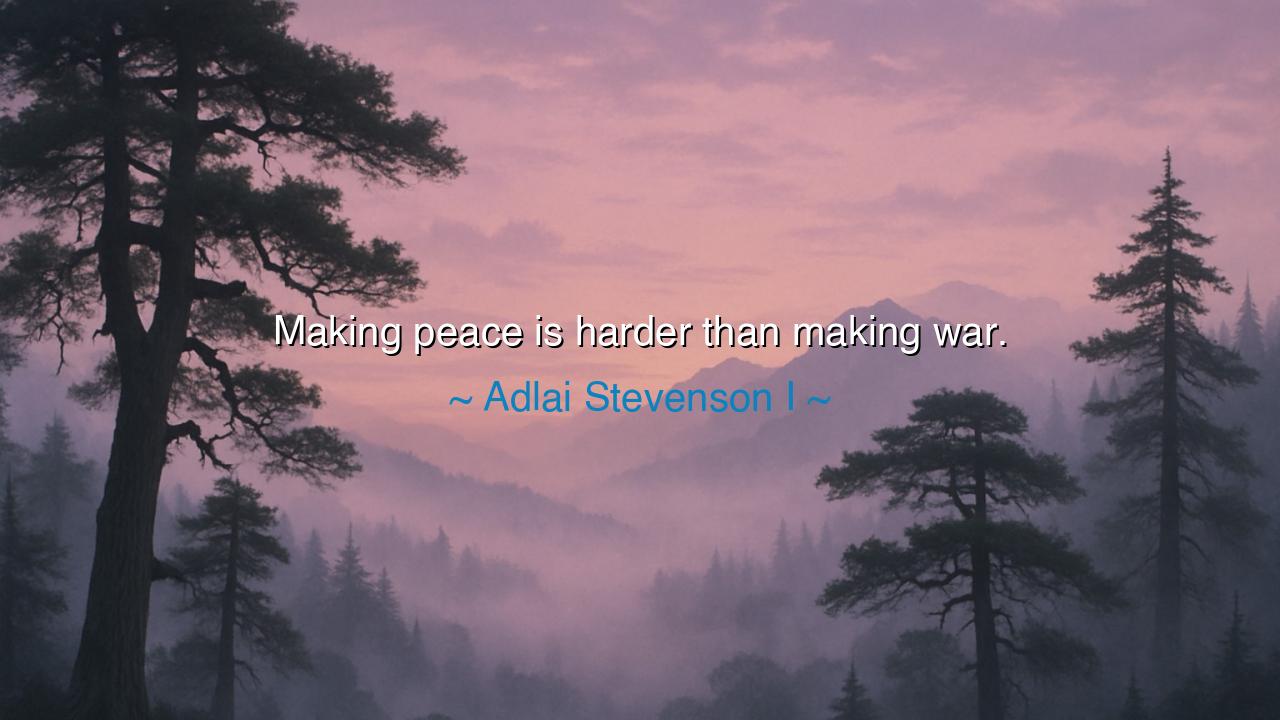
Making peace is harder than making war.






“Making peace is harder than making war.” Thus spoke Adlai Stevenson I, a statesman of America in the nineteenth century, and his words ring with the sorrowful wisdom of one who has witnessed the clash of men and the fragility of nations. In this short utterance lies a profound paradox: that war, though drenched in blood, is often easier to unleash than to restrain, while peace, though gentle in appearance, demands a labor of spirit, patience, and sacrifice greater than any battle.
The ancients themselves saw this truth. It was easier for Alexander to raise his armies and sweep across Persia than to govern the vast empire he had conquered. It was easier for Caesar to march on Rome with legions than to knit together a republic frayed by division. War demands courage, yes, but also feeds upon anger, pride, and vengeance—passions swift to ignite in the human heart. Peace, by contrast, demands humility, forgiveness, and trust—virtues slower to grow, for they must be cultivated like delicate flowers in a soil long hardened by hatred.
Consider the American Civil War. The war itself was fought with fury, ending slavery but leaving the land scarred. Yet when the fighting ceased, the harder work remained: to reconcile a nation divided, to bind up wounds, to restore fellowship between North and South. Abraham Lincoln, in his last speech before death, spoke of “binding up the nation’s wounds.” He knew that making peace would test the people far more than the clash of arms. And indeed, reconstruction proved long, bitter, and incomplete, proving Stevenson’s words true: the aftermath of war is often more difficult than war itself.
We see this lesson too in the fate of Europe after the First World War. Victory had been won in the trenches, but when the victors gathered at Versailles, the spirit of peace was overshadowed by revenge. Reparations and humiliation were imposed, and rather than healing, bitterness took root, giving birth to another and greater war. It was not the guns that failed, but the peacemakers. They showed that war can be ended by force, but only peace, wisely made, can prevent war’s return.
And yet there are brighter examples. After the Second World War, leaders remembered the lesson. Instead of crushing their enemies utterly, they built the Marshall Plan, investing in the recovery of former foes. They created the United Nations, however flawed, as a forum for dialogue. They forged bonds of cooperation between nations once hostile. This was the harder path, for it demanded generosity where vengeance might have been easier, forgiveness where resentment burned hot. But from that effort of peace-making came decades of relative stability and prosperity.
The lesson for us is timeless: peace requires more than the silencing of weapons. It requires the silencing of pride, the conquering of fear, the choosing of reconciliation over revenge. It demands not only treaties signed by rulers but hearts changed among peoples. This is why it is harder, and why it is greater. For any man can strike in anger, but it is the truly strong who can forgive, who can labor for understanding, who can build where others destroy.
Practical actions follow. In your own life, remember that ending an argument is not the same as making peace. Do not only cease the fight—seek also to restore the bond. Practice listening when anger would silence, offering forgiveness when vengeance would tempt. In communities, work for justice, for without justice peace is fragile. And in nations, urge leaders to pursue reconciliation, not domination, remembering that peace, though harder to achieve, is the only soil in which prosperity and freedom may endure.
Thus Stevenson’s words stand like an eternal flame: making peace is harder than making war. Harder, yes—but more noble, more enduring, more divine. For war is the work of a moment, but peace is the labor of generations. And so I say to you: do not shrink from the harder task. Choose the way of peace, though it demand more of you, for in that labor lies the hope of the world.






DTDien Thong
Stevenson’s point is thought-provoking, but it also makes me wonder: Is peace truly harder than war, or does it just require a different type of effort? War often brings temporary resolution through force, but peace requires ongoing commitment and cooperation. Can we ever reach a place where peace feels easier or more natural, or is it always going to be a struggle requiring continuous effort and understanding?
TVThao Vy
I completely agree with the sentiment in Stevenson’s quote, but it raises a deeper question: What are the barriers that make peace so elusive? In the aftermath of conflict, is it our human nature to hold onto grudges and resentment, making reconciliation harder? How do we overcome the emotional and psychological barriers that make peace feel impossible, even when there is a genuine desire for it?
GDGold D.dragon
Stevenson’s quote resonates with the idea that while war can be impulsive or reactionary, peace demands patience and effort. But why is peace so difficult to achieve? Is it because of the deeply ingrained divisions between people, or is it more about the unwillingness to compromise? What do we need to prioritize in our societies to make peace a more achievable goal instead of just a temporary solution or a ceasefire?
VQVo Quynh
Adlai Stevenson I’s statement about peace being harder than war really makes me think about the complexity of conflict resolution. War is often seen as a direct response to clear goals or enemies, but peace requires negotiation, understanding, and sometimes sacrifice from all sides. How can we shift our mindset to focus more on the efforts needed to achieve lasting peace, especially in a world that seems more focused on competition and conflict?